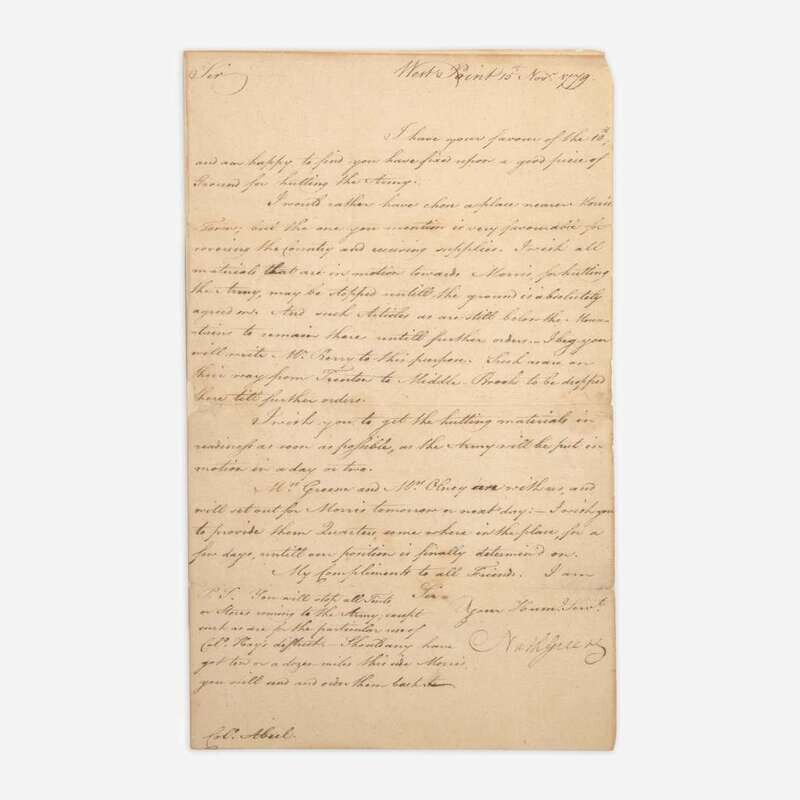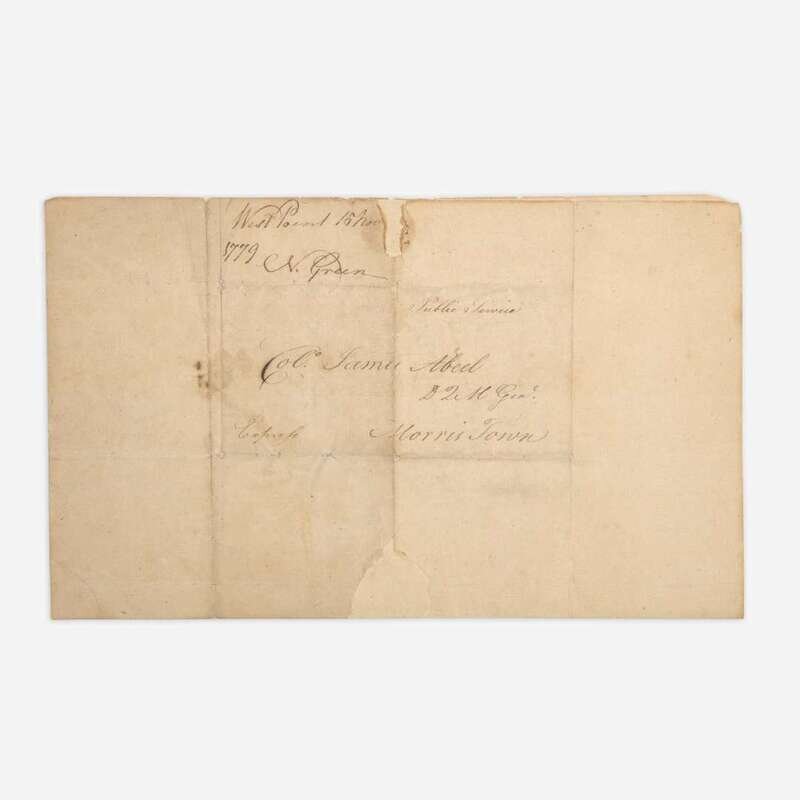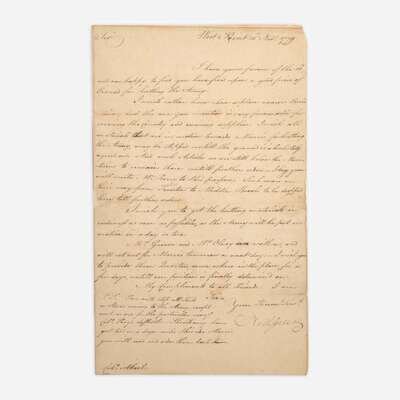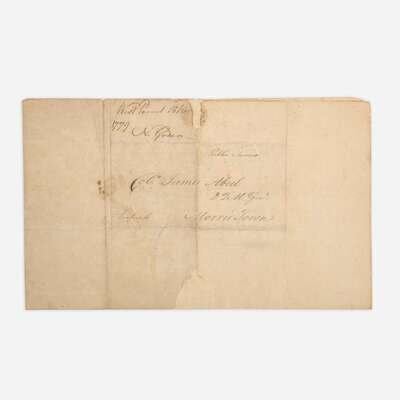Condition Report
Contact Information
Lot 7
Lot Description
Major General Nathanael Greene writes to his Deputy Quartermaster General to make preparations for the Continental Army's winter encampment ahead of the brutal winter of 1779-80
West Point, (New York), Nov(ember), 15, 1779. One sheet folded to make four pages, 11 3/4 x 7 3/16 in. (298 x 182 mm). Manuscript letter in a secretarial hand, signed by Major General Nathanael Greene as Quartermaster General of the Continental Army, to Colonel James Abeel, his Deputy Quartermaster General, based in Morristown, New Jersey; addressed in a secretarial hand on verso of integral leaf, with "Public Service" frank to same; docketed in an additional hand. Silked; creasing from contemporary folds; restoration near loss from wax seal. This letter is summarized in Volume V of The Papers of Nathanael Greene, pp. 77-78 (edited by E. Carp, et al, University of North Carolina Press, 1976). Lot includes an engraved image of Greene.
"I have your favour of the 10th and am happy to find you have fixed upon a good piece of Ground for hutting the Army.
I would rather have chose a place nearer Morris-Town; but the one you mention is very favourable for covering the Country and receiving supplies. I wish all materials that are in motion towards Morris, for hutting the Army, may be stopped untill (sic) the ground is absolutely agreed on. And such Articles as are still below the Mountains to remain there untill further orders.--I beg you will write Mr. Berry to this purpose. Such as are on their way from Trenton to Middle-Brook to be dropped there till further orders.
I wish you to get the hutting materials in readiness as soon as possible, as the Army will be put in motion in a day or two.
Mrs. Green and Mrs. Olney are with us, and will set out for Morris tomorrow or next day: --I wish you to provide them Quarters, some where in the place, for a few days, untill (sic) our position is finally determined on.
My compliments to all Friends. I am Sir your Huml. Servt.
Nath. Greene
P.S. You will stop all Tents, or Stores coming to the Army; except such as are for the particular use of Colo. Hay's district.--Should any have got ten or a dozen miles this side Morris, you will send and order them back."
Major General Nathanael Greene writes to his Deputy Quartermaster General, James Abeel, concerning a proposed campground in Morristown, New Jersey, for the Continental Army's upcoming winter encampment.
As winter loomed in the fall of 1779, George Washington looked to Morristown for a suitable location for a long-term encampment. Located about 30 miles west of British-occupied New York City, it was a familiar place, as the Continental Army had previously camped in the area during the winter of 1776-77. Its abundant natural resources, its location on a key American supply route, and its position behind the Blue Hills--a natural defense against a surprise British attack--made it an ideal spot for Washington and his men to dig in for the long winter ahead. Greene, who was appointed Quartermaster General in 1778, directed Abeel to begin looking for a campsite early that same November. By mid-month Abeel had reported at least three different possibilities in the area, and Greene arrived there on November 20 to personally oversee the search. By the end of the month Washington selected the 1,400 acre grounds of Jockey Hollow, located on the estate of Captain Henry Wick. Construction of the camp's "log house city", of more than 1,000 timber-hut structures, was quickly built to shelter the more than 10,000 American troops.
Although the winter at Valley Forge in 1777-78 is famously remembered as the most difficult period for the Continental Army, the winter at Morristown was by several accounts much worse, and would prove to be one of the most challenging episodes for the Army during the entire war. For several months, beginning on December 1, 1779, Washington's troops were trapped in what is considered one of the coldest winters ever on record. They faced a series of unrelenting snowstorms during the unusually brutal season, including a two-day blizzard in January, and temperatures that routinely hovered below freezing. Greene, who brought order to the Quartermaster's office during the Valley Forge episode, and who had proved so incredibly effective there, faced near-insurmountable obstacles keeping the Morristown troops fed and clothed. Due to myriad reasons--from a powerless Congress unable to requisition supplies or money from states, local farmers reluctant to provide food due to the previous season's bad crops as well as poor prices offered by Army, and severe winter conditions--supplies and food were persistently scarce. As the winter dragged on frustration within the camp grew as conditions worsened and desertions increased. By spring an attempted mutiny broke out but was quickly put down. By June 1780 Washington's men finally left the camp, but they were entering some the war's darkest days as the British were quickly retaking cities across the South. At the end of the year Greene was appointed by Congress to take command of the Southern Army, and within 18 months his campaign in the Carolinas and Georgia helped turn the tide of the war and secure American victory.



